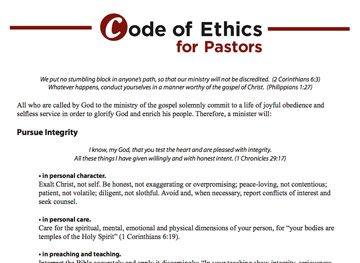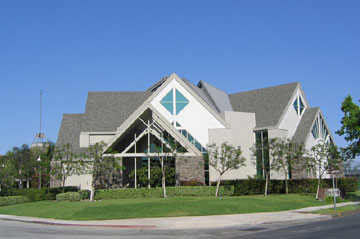Code of Ethics for Pastors: A Commentary
The National Association of Evangelicals has just released a new Code of Ethics for Pastors. This three-and-a-half page document features five major admonitions for ethical behavior:
Pursue Integrity
Be Trustworthy
Seek Purity
Embrace Accountability
Facilitate Fairness.
Under each category, there are several statements of clarification or application.
 Why has the NAE created this Code? According to the NAE Press release:
Why has the NAE created this Code? According to the NAE Press release:
With a desire for pastors to make sound ethical decisions and to flourish, the National Association of Evangelicals developed the NAE Code of Ethics for Pastors designed to provide a consistent code of ethics that crosses denominational lines.
“Most pastors are highly ethical, but few have signed a written code of ethics,” said Leith Anderson, NAE President. “This is every pastor’s opportunity to know, commit and tell others about a personal and professional standard of biblical pastoral ethics. I invite every pastor and every church board to put this code of ethics on the agenda for an upcoming meeting. Discuss. Adopt. Live these standards.”
Luder Whitlock, who chaired the document’s taskforce, adds:
Thanks to the leadership of Leith Anderson, the board of the NAE has prepared a long overdue Code of Ethics for Pastors. This succinct statement provides guidance for pastors who desire to honor the Lord by their example as well as by what they confess and preach. We expect it will soon become indispensable as a reference for pastoral ethics.
The Code has been signed by several prominent evangelical pastors, including:
Charles Blake, West Angeles Church of God in Christ; Joel Hunter, Northland, A Church Distributed; Bill Hybels, Willow Creek Community Church; Tim Keller, Redeemer Presbyterian Church; Max Lucado, Oak Hills Church; John Ortberg, Menlo Park Presbyterian Church; Samuel Rodriguez, New Season Christian Worship Center; and Bryant Wright, Johnson Ferry Baptist Church.
My initial reaction? Gratitude to the NAE and to those who crafted the Code. Appreciation for their wisdom. Curiosity about what the Code says (and doesn’t say) and why. And, as I read through the Code for the first time, I felt both encouraged and challenged in my own life and work as a pastor. This is a fine statement. I need it. Pastors need it. The church needs it.
What’s Missing from the NAE Press Release
As I read the NAE press release, I was a bit surprised to find something missing, something I strongly expect has motivated the NAE to compose the Code. I wonder why it was not mentioned. I’m talking about the fact that so many pastors these days are falling short when it comes to pastoral ethics. Yes, Leith Anderson is right, “Most pastors are highly ethical.” But, I’m sad to say, thousands of pastors are not. I’m not just talking about occasional failures, which would be expected of human beings in general, including pastors. Rather, I’m thinking of patterns of unethical behavior that can undermine pastoral ministry and devastate church communities. We can all think of some of the most obvious examples of this sort of thing because they regularly fill the headlines. But I have watched with sadness as dozens of ordinary pastors in ordinary churches have been removed from their pastorates or choose to resign because of moral failures. I know the NAE is all too aware of this reality because one of their former presidents was forced to resign his own pastorate for this reason.
Moreover, if you take the five admonitions of the Code – pursue integrity, be trustworthy, seek purity, embrace accountability and facilitate fairness – you could easily chart out the major areas of pastoral failure in our day: lack of integrity, untrustworthiness, impurity, lack of accountability, and unfairness. But the NAE doesn’t mention say this in their press release. Why not?
Reading between the lines, my guess is that the NAE wanted to focus on the positive rather than the all-too-familiar negative. The organization seeks to encourage, challenge, and support all pastors, including those who are among the majority who are truly seeking to live with integrity in all they do. Moreover, the positive approach of the NAE will, I hope, foster a conversation in the church and culture that doesn’t focus on failures, but rather that seeks to clarify and promote a high standard for pastors.
In the days ahead, I will examine the Code of Ethics for Pastors in some detail, offering my reflections and an occasional criticism as someone who has been a pastor for twenty-five years.
Could the NAE Be a Little More Welcoming?
I do have one initial criticism, not of the Code itself, but of the mechanism for pastors to sign the Code. When I went to sign, I got to the menu for “Denomination.” There was a scrolling menu. I looked for Presbyterian Church USA, and did not find it. I found the Presbyterian Church in America and the Evangelical Presbyterian Church. But no PCUSA. I had to choose “Other” as my denomination. Now, I realize that the PCUSA itself is not an evangelical denomination. Perhaps the only denominations that get listed are the ones with an official NAE connection. But there are thousands of evangelical pastors in the PCUSA who might very well want to sign the Code. The same is true of United Methodists, Evangelical Lutherans, etc. It would feel more welcoming (and, indeed, truthful) if we could acknowledge our denominational affiliation. I hope the NAE will edit their menu to be more inclusive of evangelicals in a wide array of denominations. At least give us a chance to explain the meaning of “Other.”
If this sounds petty, I apologize. But I think one of the sad failings of American evangelicalism is the tendency to draw lines that exclude people, creating a conservative Christian ghetto that can be irrelevant both to the larger church and to the culture. Usually, the NAE doesn’t fall into this trap. I hope they escape from it soon. Moreover, it would serve the NAE’s purposes well if it was seen that the Code was relevant to a wider array of pastors and churches.
Still, my last word is, once again, one of thanks to the NAE for crafting the Code of Ethics for Pastors. This is a wise and timely document.
More later . . . .















